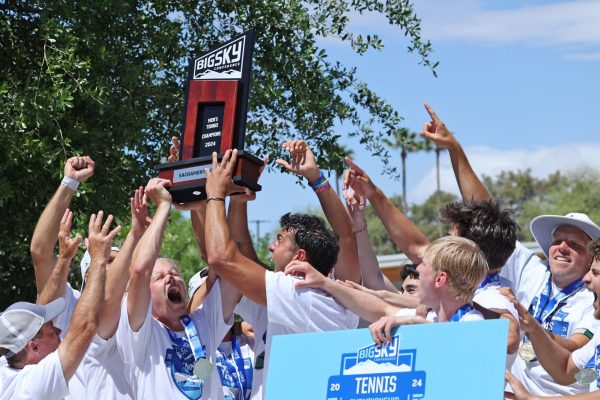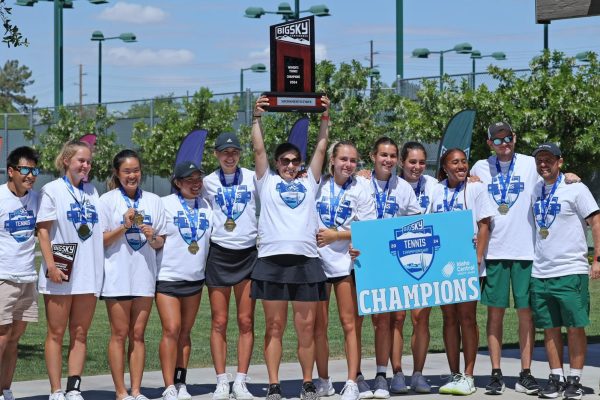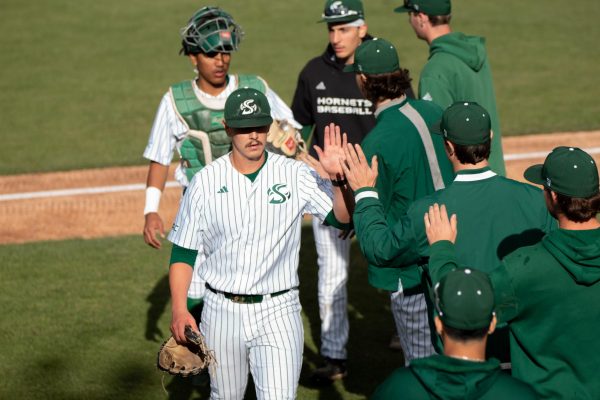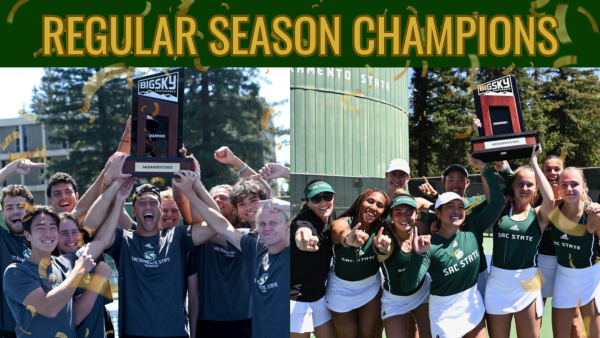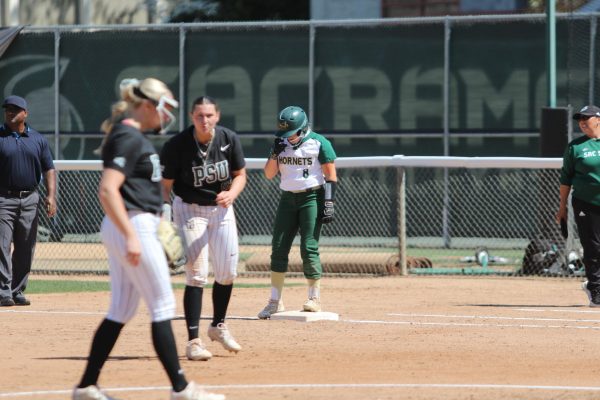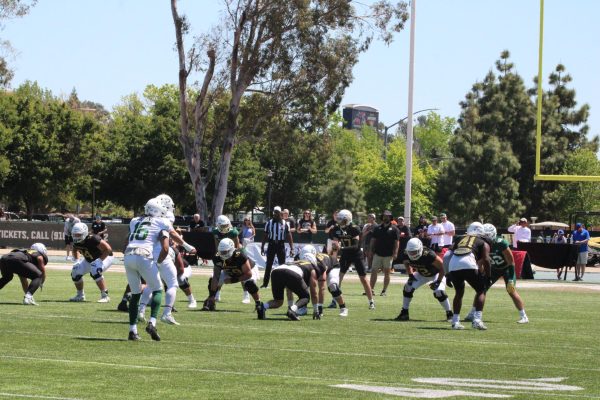Faith on the field
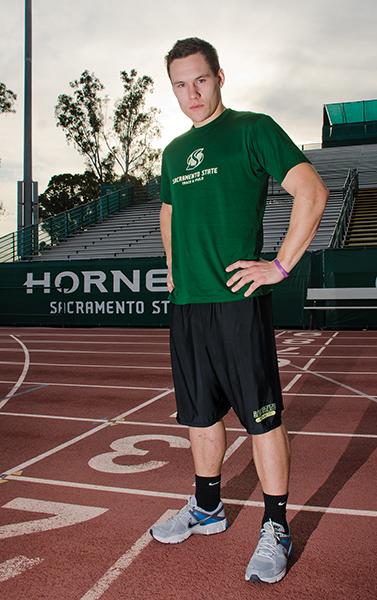
Sophomore track and field athlete Jesse Elvrom feels there is a right and wrong way to represent God.
February 22, 2012
When Collin Burnett and Jesse Elvrom see Tim Tebow take a reverential knee in the end zone or read the apostle Paul telling the Corinthians whatever they do should be done to God’s glory, one thing becomes apparent to them – there is no such thing as the separation of church and sport.
Burnett and Elvrom are two Sacramento State student-athletes who have been inspired by Tebow’s controversial and polarizing example to use their own respective sports as a platform for publicly expressing their faith.
“It’s definitely helped me,” Burnett said. “Honestly, it’s inspired me a lot to see someone who’s not afraid to share their faith all the time.”
Burnett, an undeclared freshman quarterback, said Tebow is merely trying to give credit where credit is due when he brings his faith into his game.
“It’s all about giving glory to God and being humble,” Burnett said.
Elvrom, a sophomore psychology major and member of Sac State’s track and field team, said it was God who brought him peace after he endured some terrible circumstances as a child. Since then, he said his relationship with God has been paramount, and like Burnett, he thinks Tebow’s self-effacing example is a testimony worth emulating.
“It’s not about self-conceited actions but more about having pride for God,” Elvrom said. “If I succeed at track, all the glory goes to God. We’re not living this life for the glory.”
Tebow’s public expressions of faith first gained attention while he was a quarterback at the University of Florida. It was not uncommon during Gators’ games to see Bible passages like John 3:16 emblazoned across his eye black.
But it was not until 2011, his second NFL season, when his faith really became a hot topic of discussion.
Six games into the season and with the Denver Broncos sitting at 1-4, Tebow replaced Kyle Orton as the team’s starter. He subsequently helped the team win seven of its next eight games and eventually led the Broncos to the playoffs.
During the span of those eight games, Tebow’s penchant for comebacks coupled with his copious expressions of faith drew both the awe and ire of sports fans everywhere.
The media were all over him and some found it all a bit too much to handle.
One such critic was former Broncos’ quarterback Jake Plummer, who had some choice words to share about Tebow last November.
“I think that when he accepts the fact that we know that he loves Jesus Christ, then I think I’ll like him a little better,” Plummer told a Phoenix radio station XTRA Sports 910. “I don’t hate him because of that. I just would rather not have to hear that every single time he takes a good snap or makes a good handoff.”
Burnett said he understands why people hold those types of sentiments but he does not let criticism keep him back from expressing his beliefs.
“Some people think it’s not appropriate, that (religion and sports) should be separate,” Burnett said. “It’s going to happen. People are going to criticize you for what you believe and you just have to stay strong. It comes with being a Christian.”
Robert Briggs, the pastor of Immanuel Baptist Church in Sacramento, said he agrees with the stance these students are taking.
“Every area of life in which we participate is an appropriate platform for sharing faith,” Briggs said.
Briggs said asking Christians like Burnett and Elvrom to refrain from expressing their beliefs is like asking a man to hide he is a man or asking someone to conceal their skin color.
“Christianity is not just a private personal conviction,” Briggs said. “Christianity is a way of life itself. It actually defines who we are in terms of our identity. So there is no way a true Christian can keep it merely as a private matter because it actually defines them.”
As for Tebow’s actions on the field, Briggs said he thinks he is simply being opportunistic.
“In the context in which he plays his sport – America with all its commercialization – he’s taken advantage of that to advertise Christ and the gospel,” Briggs said.
Briggs also said he thinks Tebow might do well to tone things down just a notch.
“Maybe what Tim Tebow needs to realize is that he doesn’t have to make reference to God every single time regarding his sporting activity,” Briggs said. “I think it’s established that he’s a Christian. Now he needs to go out and play the best game he can.”
Briggs said he hopes Tebow’s primary influence on student-athletes will come in the form of encouraging them to live lives consistent with what they profess. He points to Eric Liddell as a prime historical example of this.
Liddell, who is the central character of the Academy Award-winning film “Chariots of Fire,” was a sprinter at the University of Edinburgh in Scotland during the 1920s. He gained notoriety for his faith when he refused to run an Olympic race he was heavily favored to win because his heat fell on a Sunday.
For Liddell, running the race would have meant compromising his beliefs by breaking the Fourth Commandment, which in part prohibits working on the Sabbath.
“He stands as probably the greatest example of a Christian in sport who refused to compromise his testimony,” Briggs said. “Yet it wasn’t by what he wore on his jersey, it wasn’t in public displays of faith by bowing in prayer, it was by a principled stand for righteousness.”
Briggs said he wants student-athletes to be more concerned with their behavior on and off the field than with vocalizing their beliefs.
“It’s not what you wear on your eyes or what you wear on your jersey,” Briggs said. “It’s how you treat your opponents, it’s how you cope with defeat and victory that people will look at.”
Elvrom shares Briggs’ sentiments.
“As much as we want to represent God, we shouldn’t represent him in a bad way,” Elvrom said.
The act of Tebowing, which is kneeling and praying after a big moment in a game, is an appropriate way to represent God, Elvrom said.
“It’s cool,” Elvrom said. “If it’s done in fun.”
Briggs also said he finds the practice amusing but has a word for all the would-be “Tebow-ers” on campus.
“You’re not at school to Tebow,” Briggs said. “You’re at school to listen and learn.”
Burnett agreed and said sharing his faith on campus is more about loving his neighbor than it is about playful gestures.
“The great commission tells you to tell the world about Jesus, about his love,” Burnett said. “It’s a huge part of your faith. That’s what Jesus did, he came to tell people about what he was doing. His platform wasn’t sports, but you can use whatever, you know?”
David Somers can be reached at [email protected].




































































































































